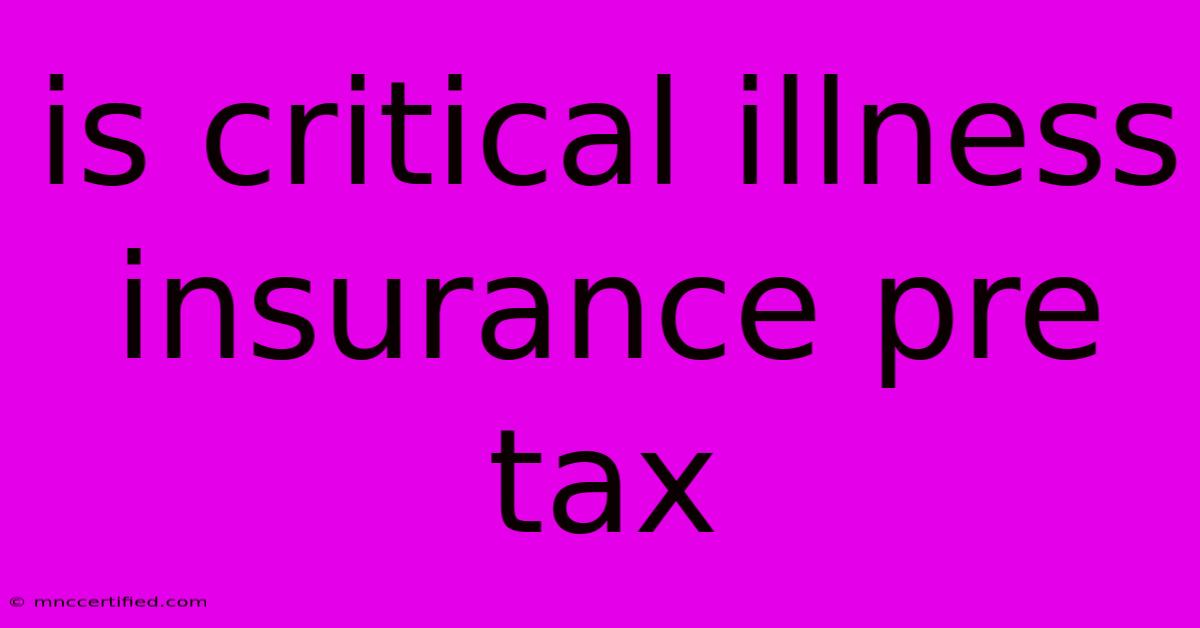Is Critical Illness Insurance Pre Tax

Table of Contents
Is Critical Illness Insurance Pre-Tax? A Guide to Tax Benefits
Critical illness insurance is a valuable financial safety net, offering a lump-sum payment upon diagnosis of a serious illness. But, when it comes to taxes, many wonder: is critical illness insurance pre-tax? The answer isn't straightforward and depends on your individual circumstances and the specifics of your policy.
Understanding Tax Implications
Whether you can deduct critical illness insurance premiums or receive a tax-free payout depends on several factors, including:
- Type of Policy: The structure of your critical illness insurance policy determines its tax treatment. Policies offered through an employer may be treated differently than individual policies purchased directly.
- Location: Tax laws vary from country to country. It's essential to research the specific tax regulations in your region.
- Policy Benefits: The specific benefits offered by your policy might influence tax implications. For example, some policies include features like disability income benefits, which may be subject to taxation.
The Case for Pre-Tax Premiums
While not always the case, some critical illness insurance policies may allow for pre-tax premium payments. This means your contributions are deducted from your income before taxes, resulting in potential tax savings.
Here's why you might enjoy this benefit:
- Lower Tax Burden: Deducting premiums reduces your taxable income, resulting in a lower overall tax bill.
- Potential Savings: These savings can be significant over time, especially for individuals with higher income brackets.
The Case for Tax-Free Payouts
In some cases, critical illness insurance payouts can be tax-free. This is particularly true if the policy is structured as a life insurance policy with a critical illness rider.
Here's why tax-free payouts are beneficial:
- Financial Relief: Receiving a tax-free lump sum can ease the financial burden associated with a critical illness.
- Maximizing Benefits: Keeping the full payout ensures you have the most resources available for medical expenses, treatment, and other needs.
Navigating the Tax Landscape
The best way to determine the tax implications of your critical illness insurance is to consult with a tax professional or financial advisor. They can provide personalized guidance based on your specific policy and location.
Key Takeaways
- No universal answer: The tax treatment of critical illness insurance depends on your individual circumstances and policy specifics.
- Potential for tax advantages: Some policies offer pre-tax premium payments or tax-free payouts, but it's crucial to clarify these aspects with your provider.
- Professional advice is essential: Consult with a tax expert or financial advisor for personalized guidance.
By understanding the potential tax implications of critical illness insurance, you can make informed decisions about your financial protection and maximize the benefits of this valuable coverage.

Thank you for visiting our website wich cover about Is Critical Illness Insurance Pre Tax. We hope the information provided has been useful to you. Feel free to contact us if you have any questions or need further assistance. See you next time and dont miss to bookmark.
Featured Posts
-
Will Insurance Cover Unregistered Car
Nov 10, 2024
-
Live Stream Brighton Vs Man City Tv Channels
Nov 10, 2024
-
Clemsons Woods Injured Swinney Gives Update
Nov 10, 2024
-
Jemimah 2024 T20 World Cup Underperformance
Nov 10, 2024
-
Watch Brighton Vs Man City Live Tv And Streaming
Nov 10, 2024